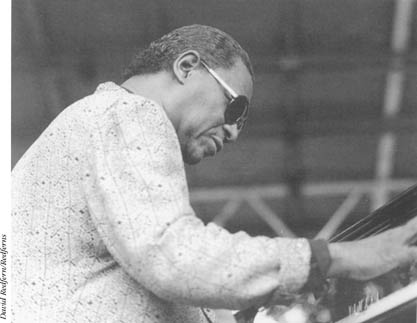
”Elder statesman of jazz” McCoy Tyner remains an exciting, creative contributor to the modern jazz scene.
Aunique jazz pianist unsurpassed in musical fire,style, and overall sound, McCoy Tyner has?enjoyed a long and successful career in both supporting roles and as a soloist, bandleader, and composer.?His creative and extraordinary tenure with the John COLTRANE Quartet from I960 to 1965 (with band-?mates Coltrane, Jimmy Garrison, and Elvin JONES) earned Tyner the position of venerated master and a ;?place in the annals of jazz history.
McCoy Tyner was born in Philadelphia on -December 11, 1938, and studied piano from an early : age through his college years. He first gained serious cattention as a member of Art Farmer and Benny Golson’s Jazztet in the late 1950s, but by I960 he had received and accepted an offer to join the new John Coltrane group. Over the next five years, saxophonist Coltrane, Tyner, drummer Elvin Jones, and bassist Jimmy Garrison set about redefining jazz. In helping to establish and expand upon the ideas of Miles DAVIS’S modal jazz and Ornette COLEMAN’S free jazz experiments, they created several classic recordings, including “My Favorite Things,” “A Love Supreme,” “Africa Brass,” and “Sun Ship.”
It was during this period that Tyner developed many of his unique abilities—interesting, open chord-voicings, a departure from traditional jazz harmony necessitated by Coltrane’s focus on modal playing, an aggressive but controlled rhythmic style, and most of all, endurance. Live and on record, the Coltrane Quartet often improvised on pieces that lasted 20 or 30 minutes each. The muscular propulsion of Garrison and Jones, and the Coltrane penchant for long exploratory solos, demanded similar stamina from Tyner.
Tyner left Coltrane in 1965, and after some lean years embarked on a solo career that has included releases on the Impulse, Blue Note, Milestone, and Elektra labels. Tyner has recorded and performed with Jackie McLean, Arthur Blythe, Ron Carter, and Joe HENDERSON, among others, and has helped initiate or propel the careers of John Blake, Joony Booth, and Alphonse Mouzon.

”Elder statesman of jazz” McCoy Tyner remains an exciting, creative contributor to the modern jazz scene.
By continuing the experimental direction set by the Coltrane Quartet, Tyner allows the jazz public to hear and evaluate these experiments. His own compositions, which include “Blues on the Corner,” “Land of the Lonely,” and “Desert Cry,” are informed by the dynamism of his playing, and by the African, European, and Oriental music traditions that influence his music. Through it all, he remains steadfastly a hard-swinging modern jazz pianist thoroughly grounded in the hard bop tradition.
Gregg Juke
SEE ALSO: FREE JAZZ; JAZZ; MODAL JAZZ.
FURTHER READING
Feather, Leonard. The Passion for Jazz (New York: Da Capo Press, 1990);
Lyons, Len. The Great Jazz Pianists (New York: Da Capo Press, 1983).
SUGGESTED LISTENING
Enlightenment; Inception; The Real McCoy; Sahara;
John Coltrane: Impressions; A Love Supreme.